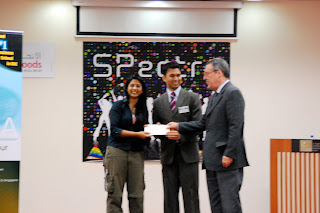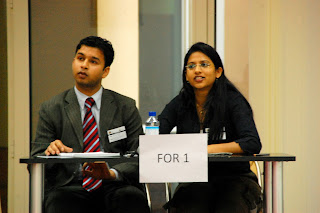The sweet taste of victory
I recently won the first at an inter college debate competition held here in Dubai. There were 11 teams in all from a variety of colleges and I was the only girl among all the participants. The topic for the preliminary elimination round was the same as the title of this post. By the draw of lots, I

got to speak against the motion. Fortunately, it didn't conflict with my own thoughts. But the other speakers had spoken so brilliantly, that I developed cold feet and butterflies and dragonflies in my tummy.
I went to the lectern, cleared my throat in a desperate attempt to find my voice which by now had reclined deep inside my alimentary canal. I finally took one sweeping look at all the faces in the auditorium, paused at the faces of the judges and with a nod of my head, began to speak. I can't explain what happened to me, but my brain unusually reduced its processing power from 4.8GHz to 800MHz. I missed a few points that I wanted to make, blabbered something that sounded quite differently in my head and before I knew it, I had concluded my speech! As I returned to my seat, I drowned in the sinking feeling of under-performance. The aching feeling of knowing that you could have done so much better, the despicable feeling of not meeting standards you set for yourself. My colleagues from my college said I'd performed well, but it somehow didn't make a big difference to me. But I told me to trust in myself and the last minute thinking I'd done on the stage.
I patiently waited for the results to be announced. And I can't mathematically express to any degree of certainty, the ratio in which were mixed my feelings of euphoria and pleasant surprise. The subsequent rounds went off a bit better as the initial success had boosted my morale and confidence in me a bit. And of course, we brought the first prize back home. I can never adequately thank Ashutosh for being there with me throughout , the win wouldn’t have been possible without his support as a team mate - here's to him!
I've penned a near reproduction of what I'd spoken that day, just for reference.
The words that cast the magic
Muhammad Ali, the legendary American Boxer once captured the spirit of sportsmanship in very profound words when he said that Champions aren't made in the gyms. Champions are made from something they have deep inside them -- a desire, a dream, a vision.
International sports have always been a medium of international solidarity, a way of replace international conflict with a platform for friendly competition. It salutes the greatness of the human spirit. In a world where wealth and prosperity have not been distributed equally or fairly, international sports provide that superior prospect for countries to contest each other on a level

playing field. Consider the types of obstacles — racial, economic, social, political, etc. — that different athletes, from the plethora of countries that participate, face in order to get to the international arena.
Increasing competition between countries, to save their national pride, has time and again propelled society's demand for excellence from its athletes and sports persons. This has caused athletes to seek alternative means to enhance their performance. In this world of instant email, instant messaging and instant coffee comes modern day science offering for those seeking an edge over one’s opponents in the form of the use of performance-enhancing drugs as a part of athletic competition. Today's athletes face an increasingly difficult choice: to use drugs to enhance performance or to accept what could amount to a competitive handicap. It is a choice, which carries significant considerations, not only ethical but also political, social, technological and economic. Should athletes be permitted to make this choice, or should society, through the medium of sports' governing bodies exercise control and strictly enforce the ban on performance enhancing drugs?
Some argue that the choice should be left to the athletes in order to respect their individual choice above any ethical considerations. Others choose to ban performance-enhancing drugs with the intention of protecting the athlete against the potentially harmful consequences of his or her own actions. Athletes who are caught using illegal drugs are often exposed through the media and negatively discriminated against by the sporting community. The result is that the athlete faces a double bind conflict: he or she is pressured to produce superhuman performance, yet must remain ethically human while preparing for them. The ramifications of cheating in sport are numerous and all negative in nature. Beyond the negative aspect which cheating in sports presents, are dangerous physiological and psychological side effects, which the athlete faces when using performance enhancing drugs such as anabolic and androgenic steroids.

If performance enhancing drugs were permitted in all sports competitions, contend purveyors of the drug ban, it would no longer be a factor of competitive advantage as each athlete would have an equal opportunity to make use of PEDs. They argue that drug use is one advantage among many, such as access to superior coaching or training facilities that athletes may or may not have at their disposal to sharpen their competitive edge. The fact that all athletes are not starting with the same set of advantages discredits the notion that a “level playing field” can somehow be restored if drugs are eliminated. According to this view, performance-enhancing drugs are simply making up for an athlete’s natural deficiencies or quality of training. Not only would this make athletes increasingly dependent upon performance-enhancing drugs to help them produce higher quality results than what s/he is capable of delivering naturally. But, more importantly what they fail to assess is that the athletes would have to become virtual guinea pigs in the hands of biotechnological advancement in order to remain competitive. And because athletes regularly take larger doses of steroids and other drugs than medical patients, the long term health effects of such drug use remain largely unknown. Health reports from some athletes exposed to performance-enhancing drugs offer more than adequate reason for caution.
Performance-enhancing drugs have subverted this ideal of sportsmanship in two distinct ways.
1. First, many athletes have abandoned self-restraint in this regard, resulting in a crisis of conduct
2. Second, the scientization of the athlete, either through drugs or other biotechniques, also involves a crisis of identity. To what extent can the emotional experience of competition be truly shared with an athlete who has transformed himself with drugs? Once the athlete has abandoned self-restraint, drug testing becomes the sole guarantor of the ‘integrity’ of sport.”
Sports authorities and fans have come to understand that biotechnology would inevitably provide athletes with an endless array of pharmaceutical enhancements. Controls have had to be placed on doping in order to prevent sports from becoming a science laboratory where the human spirit played second fiddle to pills and injections and man is pitched against technology.
Athletes are making more money in today’s society and they often feel the continual pressure to produce for the fans leading them to long-term addiction. Corporations the world over pour in pots and pots of money over the training and victories of the athletes. Athletes today are brand ambassadors, of not just their sports fraternity or their country, but of multinational enterprises. The use of performance enhancing drugs thus isn’t restricted to being just a reflection of the athlete’s decision but of the organisation s/he represents as well. And the victory isn’t restricted to just the gold medal but expands to include millions of quids. Allowing the use of performance enhancing drugs in sports would make it a high-risk-high-returns venture inviting inevitable power play, gambling and bookie-business.
But far more reaching is its impact on our future generations. Many of these athletes are role models to younger athletes and influence decisions on how to overcome their own obstacles. There are many examples of athlete’s using Performance-Enhancing Drugs, as they find themselves trying to break records. The generations of today and tomorrow shape themselves on the ideals of myriad sports persons who are regarded as icons of endurance. But with athletes setting examples of blatant drug (ab)use, what message would be sent out to the youth, the pillars of our societies, our nations and our future. Would we want to waste our future generations to the lame exploits of biotechnological insanity.
At the heart of anti-drug use in sport debates, lies the theory that drugs sabotage the true intention of sport. The continuing saga of drug use in sport is not only unethical but also negatively impacts the athlete and the entire sporting community.
 the Kingdom of Saudi Arabia allows their women citizens to appear in court on domestic cases and to argue cases in court. It would also permit women some marginal independence as they can fulfil some elementary legislative procedures on the grounds of their ID card alone and not a male family member’s ID. The KSA (Kingdom of Saudi Arabia) doesn’t allow its women half as much freedom that we quite take for granted.
the Kingdom of Saudi Arabia allows their women citizens to appear in court on domestic cases and to argue cases in court. It would also permit women some marginal independence as they can fulfil some elementary legislative procedures on the grounds of their ID card alone and not a male family member’s ID. The KSA (Kingdom of Saudi Arabia) doesn’t allow its women half as much freedom that we quite take for granted. 


 The content stated here is the outcome of a highly evolved, hyperactive and underutilised brain. The apparatus is also known to have had occasional ephemeral surges of being overly judgemental and opinionated.
The content stated here is the outcome of a highly evolved, hyperactive and underutilised brain. The apparatus is also known to have had occasional ephemeral surges of being overly judgemental and opinionated.